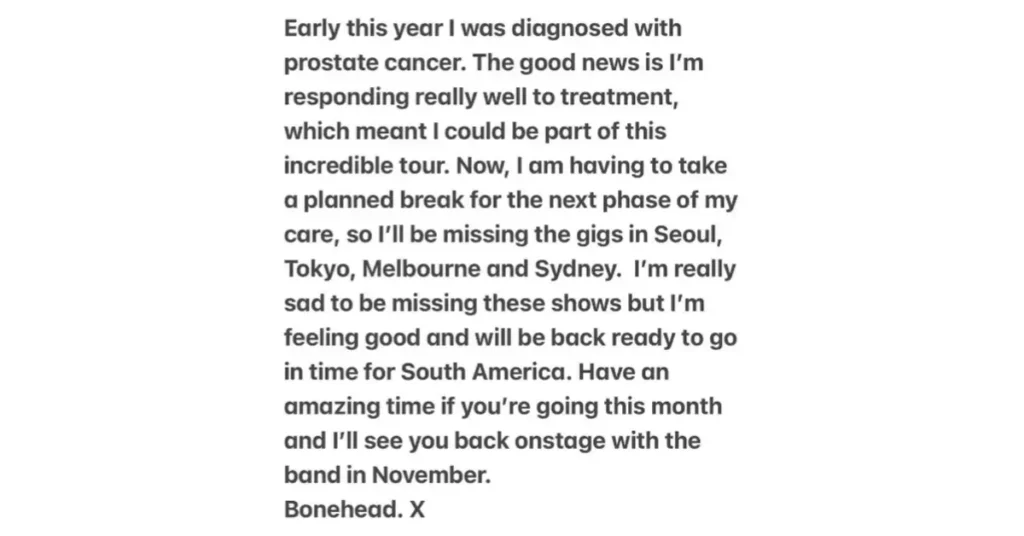Bonehead steps away from select reunion shows to focus on treatment — aiming to rejoin Oasis in November.

Paul “Bonehead” Arthurs, the beloved guitarist whose chiming riffs helped define Oasis’s sound, has announced he’s stepping away from a handful of reunion dates while he undergoes treatment for prostate cancer.
In a heartfelt Instagram update posted on October 3, the 60-year-old musician explained that his diagnosis came earlier this year.
He said the treatment has gone well enough that he was able to join the band on the road, but now he needs to take a scheduled break for the next phase of care.
As a result, Arthurs will miss shows in Seoul, Tokyo, Melbourne and Sydney — though he expects to rejoin the group for the South American leg in November.
Fans responded almost immediately with an outpouring of support. Social posts praised his contribution to the reunion and sent wishes for a swift recovery.
Many noted, as fans and bandmates have before, that Arthurs played a crucial role in bringing the Gallagher brothers back together and helping the Oasis reunion happen at all.
This isn’t the first serious health scare Arthurs has faced in recent years: in 2022 he was treated for tonsil cancer and later announced he was clear of the disease.
That difficult chapter—followed by his return to the stage—made his presence on the Live ’25 reunion all the more meaningful for fans who’d watched Oasis’ story unfold across decades.
Why this matters beyond the headlines Oasis’s reunion has been framed as a major cultural moment: it’s a chance to relive the Britpop era’s anthems with some of the original players onstage together again.
Arthurs’ temporary leave is a reminder that behind the spectacle are real people managing health, age and life changes. Touring is grueling at the best of times; when health issues surface, prioritizing recovery is the only responsible choice.
There’s also a human story here about reconciliation and vulnerability. Reports from summer shows revealed public praise from Noel Gallagher, who credited Arthurs with helping to mend a fractured band dynamic and nudging the brothers back into the same room.
That kind of gratitude—spoken in front of thousands—tells you how valued Arthurs is not just for his guitar work but for the role he played offstage.
My take: health comes first, music follows As a longtime fan of music journalism, I find this moment bittersweet. On one hand, it’s disappointing that some international fans will miss seeing Arthurs live; on the other, it’s inspiring to see a veteran musician choose self-care without theatrical drama.
In an era when performers sometimes push through illness to meet obligations, Arthurs’ candid message and decision to step back feel refreshingly honest.
This pause also gives the rest of the band—and fans—space to reflect on what matters. The reunion isn’t a one-time spectacle; it’s a living story that can absorb pauses and returns. If anything, Arthurs’ absence from a few shows will make his eventual return that much more celebrated.
A hopeful encore Arthurs’ note emphasized optimism: that treatment is going well and that he plans to be back onstage. For an artist whose guitar helped shape singalong choruses and rooftop-sized sound, that’s the best news anyone could ask for right now.
We’ll be rooting for his recovery and looking forward to the moment the band welcomes him back under the lights.











